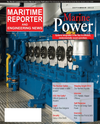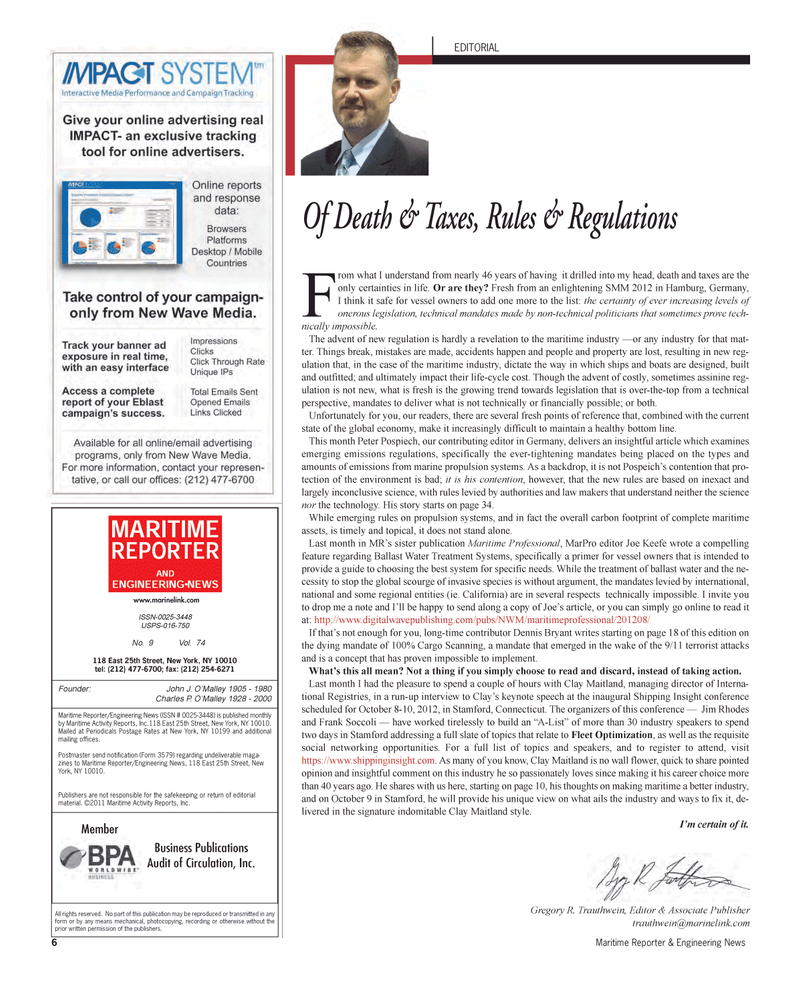
Page 6: of Maritime Reporter Magazine (September 2012)
Marine Propulsion Annual
Read this page in Pdf, Flash or Html5 edition of September 2012 Maritime Reporter Magazine
Founder: John J. O?Malley 1905 - 1980 Charles P. O?Malley 1928 - 2000 Maritime Reporter/Engineering News (ISSN # 0025-3448) is published monthly by Maritime Activity Reports, Inc.118 East 25th Street, New York, NY 10010. Mailed at Periodicals Postage Rates at New York, NY 10199 and additional mailing offices. Postmaster send notification (Form 3579) regarding undeliverable maga- zines to Maritime Reporter/Engineering News, 118 East 25th Street, New York, NY 10010. Publishers are not responsible for the safekeeping or return of editorial material. ©2011 Maritime Activity Reports, Inc. 118 East 25th Street, New York, NY 10010 tel: (212) 477-6700; fax: (212) 254-6271ISSN-0025-3448USPS-016-750No. 9Vol. 74 MemberBusiness Publications Audit of Circulation, Inc.www.marinelink.com MARITIMEREPORTER ANDENGINEERINGNEWS All rights reserved. No part of this publication may be reproduced or transmitted in any form or by any means mechanical, photocopying, recording or otherwise without the prior written permission of the publishers.Gregory R. Trauthwein, Editor & Associate Publisher [email protected] EDITORIALFrom what I understand from nearly 46 years of having it drilled into my head, death and taxes are the only certainties in life. Or are they? Fresh from an enlightening SMM 2012 in Hamburg, Germany, I think it safe for vessel owners to add one more to the list: the certainty of ever increasing levels of onerous legislation, technical mandates made by non-technical politicians that sometimes prove tech- nically impossible. The advent of new regulation is hardly a revelation to the maritime industry ?or any industry for that mat- ter. Things break, mistakes are made, accidents happen and people and property are lost, resulting in new reg- ulation that, in the case of the maritime industry, dictate the way in which ships and boats are designed, built and outfitted; and ultimately impact their life-cycle cost. Though the advent of costly, sometimes assinine reg- ulation is not new, what is fresh is the growing trend towards legislation that is over-the-top from a technical perspective, mandates to deliver what is not technically or financially possible; or both. Unfortunately for you, our readers, there are several fresh points of reference that, combined with the current state of the global economy, make it increasingly difficult to maintain a healthy bottom line. This month Peter Pospiech, our contributing editor in Germany, delivers an insightful article which examines emerging emissions regulations, specifically the ever-tightening mandates being placed on the types and amounts of emissions from marine propulsion systems. As a backdrop, it is not Pospeich?s contention that pro- tection of the environment is bad; itis his contention , however, that the new rules are based on inexact and largely inconclusive science, with rules levied by authorities and law makers that understand neither the science northe technology. His story starts on page 34. While emerging rules on propulsion systems, and in fact the overall carbon footprint of complete maritime assets, is timely and topical, it does not stand alone. Last month in MR?s sister publication Maritime Professional , MarPro editor Joe Keefe wrote a compelling feature regarding Ballast Water Treatment Systems, specifically a primer for vessel owners that is intended to provide a guide to choosing the best system for specific needs. While the treatment of ballast water and the ne- cessity to stop the global scourge of invasive species is without argument, the mandates levied by international, national and some regional entities (ie. California) are in several respects technically impossible. I invite you to drop me a note and I?ll be happy to send along a copy of Joe?s article, or you can simply go online to read it at: http://www.digitalwavepublishing.com/pubs/NWM/maritimeprofessional/201208/ If that?s not enough for you, long-time contributor Dennis Bryant writes starting on page 18 of this edition on the dying mandate of 100% Cargo Scanning, a mandate that emerged in the wake of the 9/11 terrorist attacks and is a concept that has proven impossible to implement. What?s this all mean? Not a thing if you simply choose to read and discard, instead of taking action. Last month I had the pleasure to spend a couple of hours with Clay Maitland, managing director of Interna- tional Registries, in a run-up interview to Clay?s keynote speech at the inaugural Shipping Insight conference scheduled for October 8-10, 2012, in Stamford, Connecticut. The organizers of this conference ? Jim Rhodes and Frank Soccoli ? have worked tirelessly to build an ?A-List? of more than 30 industry speakers to spend two days in Stamford addressing a full slate of topics that relate to Fleet Optimization, as well as the requisitesocial networking opportunities. For a full list of topics and speakers, and to register to attend, visit https://www.shippinginsight.com . As many of you know, Clay Maitland is no wall flower, quick to share pointed opinion and insightful comment on this industry he so passionately loves since making it his career choice more than 40 years ago. He shares with us here, starting on page 10, his thoughts on making maritime a better industry, and on October 9 in Stamford, he will provide his unique view on what ails the industry and ways to fix it, de- livered in the signature indomitable Clay Maitland style. I?m certain of it. Of Death & Taxes, Rules & Regulations 6Maritime Reporter & Engineering News MR#9 (1-9):MR Template 9/12/2012 12:12 PM Page 6

 5
5

 7
7
